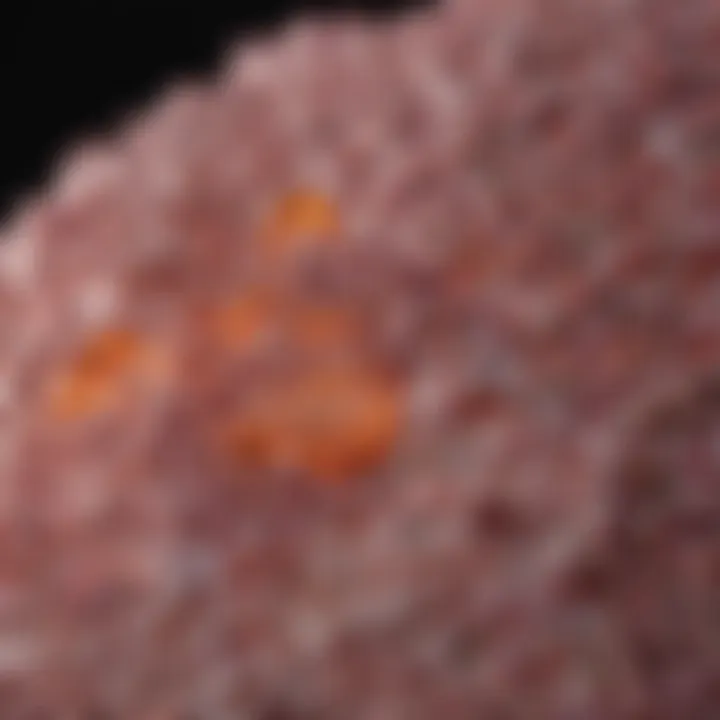Vitamin D3 and Lung Cancer: A Deep Dive


Research Overview
The connection between Vitamin D3 and lung cancer is an increasing area of interest among researchers and medical professionals. This section provides a deep dive into the key findings regarding the potential influence of Vitamin D3 on lung cancer mechanisms and progression. Recent studies suggest that Vitamin D3 may play a critical role in regulating cellular processes relevant to cancer biology, notably in lung tissue.
Summary of Key Findings
- Vitamin D3 and Cell Regulation: Vitamin D3 has been shown to affect cell proliferation and apoptosis. Research indicates that adequate levels of Vitamin D3 can induce apoptosis in lung cancer cells, potentially limiting tumor growth.
- Immune System Modulation: Vitamin D3 may enhance immune response, which is crucial in combating cancer. Several studies illustrate its ability to modulate inflammatory pathways that are often dysregulated in cancer patients.
- Preventive Potential: Epidemiological studies hint at a correlation between higher Vitamin D levels and reduced lung cancer risk. While these studies do not establish a causal relationship, they certainly warrant further investigation into the preventive aspects of Vitamin D3.
- Adjunctive Treatment: Current clinical trials are exploring the use of Vitamin D3 as a complementary therapy. Preliminary results show promise, particularly in conjunction with traditional treatments like chemotherapy and radiation.
Importance of the Research
Understanding the interplay between Vitamin D3 and lung cancer is crucial. As lung cancer remains one of the leading causes of cancer-related deaths globally, finding non-toxic preventive measures and adjunct therapies is imperative. By synthesizing existing research, we can identify gaps in knowledge and direct future studies to improve patient outcomes. Such insights can lead to groundbreaking preventative strategies in lung cancer management.
Methodology
A systematic approach to assess the relationship between Vitamin D3 and lung cancer has been employed in various research studies. The following sub-sections elucidate the methodology used across these studies.
Study Design
Most studies utilize a combination of observational and clinical trial designs. Observational studies often analyze population data to assess Vitamin D levels correlated with lung cancer incidence. In contrast, clinical trials test the effects of Vitamin D3 supplementation on existing lung cancer patients to ascertain its therapeutic benefits.
Data Collection Techniques
Data collection is critical for the validity of findings. Researchers typically gather data via:
- Blood samples: To measure circulating levels of Vitamin D3.
- Patient surveys: To understand dietary intake and lifestyle factors affecting Vitamin D levels.
- Histopathological analysis: To examine lung tissue for cellular responses to Vitamin D3.
Integrating these various methods allows for a comprehensive understanding of how Vitamin D3 interacts with lung cancer biology.
"The potential of Vitamin D3 in lung cancer represents both a challenge and an opportunity for future research. Its role in prevention and treatment underscores the need for continued exploration in this field."
Understanding these factors is critical for advancing treatment and prevention strategies, ultimately aiming for improved outcomes for lung cancer patients.
Foreword to Vitamin D3
Vitamin D3, also known as cholecalciferol, plays a key role in human health, particularly concerning bone and immune system function. This section acts as a foundation for understanding how Vitamin D3 may influence lung cancer, thereby emphasizing its significance in the broader context of health and disease.
Defining Vitamin D3
Vitamin D3 is a fat-soluble vitamin produced in the skin in response to sunlight exposure. It is part of a group of compounds known as vitamin D, which also includes Vitamin D2. The primary function of Vitamin D3 is to regulate calcium and phosphorus levels in the body, which are critical for maintaining healthy bones. In addition to these functions, Vitamin D3 is also involved in numerous biological processes, making it a crucial nutrient for overall health. Its definition establishes a framework for exploring more complex interactions, such as those with various cancers.
Sources of Vitamin D3
Vitamin D3 can be obtained through several avenues. The three main sources are:
- Sunlight: The skin synthesizes Vitamin D3 when exposed to ultraviolet rays from the sun. Optimal sunlight exposure varies by individual and geographical location, influencing how much Vitamin D3 one can naturally produce.
- Diet: Certain foods are rich in Vitamin D3, including fatty fish like salmon and mackerel, fortified dairy products, and egg yolks. For individuals who have limited sun exposure or dietary intake, nutrition plays a vital role in maintaining adequate Vitamin D3 levels.
- Supplements: For individuals at risk of deficiency, Vitamin D3 supplements are available. These can be particularly useful for those with limited access to sunlight or certain dietary restrictions.
Understanding these sources is important for practical applications in cancer prevention and treatment.
The Role of Vitamin D3 in Human Health


Vitamin D3 has several roles beyond bone health. Some essential functions include:
- Immune Function: Vitamin D3 enhances the pathogen-fighting effects of monocytes and macrophages. This can be particularly relevant in discussions of cancer, as immune response mechanisms are critical in surveillance against malignant cells.
- Cellular Growth Regulation: It influences various cellular functions, including differentiation and apoptosis (programmed cell death). These processes are vital in maintaining normal cellular function, thus potentially impacting tumor formation.
- Reduction of Inflammation: Vitamin D3 has been shown to play a part in inflammatory responses. Chronic inflammation has been linked to increased cancer risk, so this aspect is particularly noteworthy.
The importance of Vitamin D3 extends to various health outcomes, including its potential impact on lung cancer. Thus, understanding this vitamin sets the stage for deeper explorations into its specific mechanisms against diseases like lung cancer.
Understanding Lung Cancer
Understanding lung cancer is essential when exploring its connection with Vitamin D3. This knowledge lays the groundwork for discussing how Vitamin D3 may influence lung cancer progression and treatment. By comprehending the nature of the disease, we can better appreciate potential therapeutic avenues that may arise from Vitamin D3 supplementation or other interventions.
This section elaborates on three significant aspects: the epidemiology, pathophysiology, and risk factors associated with lung cancer, all of which are crucial for contextualizing the role of Vitamin D3 in cancer management.
Epidemiology of Lung Cancer
Lung cancer remains one of the most prevalent cancers worldwide. It is responsible for a significant number of cancer-related deaths each year. According to recent statistics, lung cancer is the leading cause of cancer mortality globally. The high incidence and mortality rates highlight the critical need to delve into this disease's underlying mechanisms.
Countries with high smoking rates often show elevated lung cancer cases, but other factors also play a role. Some populations exhibit higher incidences despite lower smoking rates. This disparity suggests that genetic predispositions and environmental factors might also contribute to lung cancer development. Understanding these epidemiological trends is vital. It paves the way for discussions on prevention, highlighting Vitamin D3's possible role in reducing risk across diverse populations.
Pathophysiology of Lung Cancer
Lung cancer develops through complex biological processes that involve the transformation of normal lung cells into malignant ones. At the cellular level, mutations, often triggered by environmental exposures such as tobacco smoke or asbestos, lead to uncontrolled cell growth.
There are various types of lung cancer, primarily categorized into non-small cell lung cancer and small cell lung cancer. Each type has unique characteristics and behaviors. For instance, non-small cell lung cancer is more common and tends to grow more slowly than its counterpart. Understanding these distinctions is vital for developing targeted therapies.
Recent research suggests that Vitamin D3 may influence these cellular processes, potentially modulating tumor growth. The mechanistic pathways through which Vitamin D3 operates could offer insights into novel approaches that might mitigate lung cancer progression.
Risk Factors for Lung Cancer
Identifying and understanding the risk factors associated with lung cancer is crucial for both prevention and treatment strategies. These factors include:
- Tobacco Smoking: The primary risk factor, accounting for the majority of lung cancer cases.
- Environmental Exposure: Prolonged exposure to secondhand smoke, radon gas, and occupational hazards such as asbestos significantly increase risk.
- Genetic Predisposition: Family history of lung cancer can indicate elevated risk due to inherited genetic mutations.
- Pre-existing Lung Conditions: Diseases such as chronic obstructive pulmonary disease (COPD) can increase susceptibility.
The role of Vitamin D3 in potentially mitigating some of these risk factors is an area of ongoing research.
Understanding these risk factors not only helps in recognizing at-risk populations but also guides future research into how Vitamin D3 could serve as a preventive measure against lung cancer.
The Mechanisms of Vitamin D3 Action
Understanding the mechanisms by which Vitamin D3 exerts its effects is essential in comprehending its potential role in lung cancer management. Vitamin D3, also known as cholecalciferol, is a secosteroid that plays a key role not just in bone health but also in various physiological processes throughout the body. In the context of cancer, this vitamin interacts at molecular and cellular levels to influence growth, differentiation, and immune surveillance. Through its actions on gene expression, cellular regulation, and immune modulation, Vitamin D3 presents a multifaceted approach to possibly reducing the incidence and impact of lung cancer.
Vitamin D3 and Gene Expression
Vitamin D3 influences gene expression through the Vitamin D receptor (VDR), which is a nuclear receptor. The binding of Vitamin D3 to VDR leads to the activation or repression of numerous target genes involved in cellular processes. Notably, it promotes the transcription of genes that are critical in regulating cell differentiation, apoptosis, and inhibiting the proliferation of cancer cells. This regulatory effect is significant in lung tissue where abnormal cell growth is a hallmark of cancer development. Studies have shown that Vitamin D3 can influence genes such as p21, which acts as a cell cycle regulator, hence potentially preventing uncontrolled cellular replication.
Vitamin D3 in Cellular Growth Regulation
In addition to gene expression, Vitamin D3 has a critical role in regulating cellular growth. It promotes apoptosis, or programmed cell death, a process often disrupted in cancer cells. By making cancer cells more susceptible to apoptosis, Vitamin D3 may contribute to reducing tumor size or slowing cancer progression. Furthermore, it has been reported that Vitamin D3 can inhibit angiogenesis, the process through which tumors develop their own blood supply. This limitation can deprive cancer cells of nutrients and oxygen, impairing their growth and spread. Hence, Vitamin D3 acts as a potential barrier against the development of cancerous tissues in the lungs.
Immune Modulation by Vitamin D3
The immune system is another critical area where Vitamin D3 exerts its influence. This nutrient enhances the innate immune response while simultaneously modulating adaptive immunity. Vitamin D3 aids in the differentiation of monocytes into macrophages which are crucial in fighting infections and possibly recognizing cancer cells. By enhancing the ability of immune cells to detect and eliminate cancerous cells, Vitamin D3 has a supportive role in cancer prevention. Additionally, its anti-inflammatory properties may reduce chronic inflammation, a known risk factor for various cancers, including lung cancer. Therefore, the immune modulation provided by Vitamin D3 enriches the body’s defense mechanisms against potential malignancies.


"Vitamin D3 plays a significant role in gene regulation, cellular growth control, and immune health, thereby offering insight into its potential cancer-preventative properties."
The Link Between Vitamin D3 and Cancer
Understanding the connection between Vitamin D3 and cancer is essential in the realms of nutritional research and cancer biology. Vitamin D3, also known as cholecalciferol, plays a significant role in the body, influencing numerous biological processes. As research progresses, there is increasing intrigue regarding its role in cancer prevention and management, specifically lung cancer.
This portion of the article delves into various aspects of the relationship between Vitamin D3 and cancer, focusing on clinical observations, mechanisms of action, and the empirical evidence available. By examining these elements, we can better comprehend how Vitamin D3 might impact lung cancer and, ultimately, guide interventions in clinical practice.
Clinical Observations
Clinical observations have provided a foundation for the exploration of Vitamin D3 and cancer. Studies have noted differing levels of Vitamin D among cancer patients compared to the general population. In lung cancer specifically, low serum levels of 25-hydroxyvitamin D, a marker of Vitamin D status, are often consistent.
Patients diagnosed with lung cancer frequently exhibit deficient or insufficient levels of Vitamin D. Importantly, these deficiencies do not suggest causality, but they raise significant questions regarding the potential role of Vitamin D in cancer dynamics. For instance:
- Vitamin D and Patient Outcomes: Research reveals that patients with adequate levels of Vitamin D may experience better clinical outcomes and enhanced survival rates.
- Quality of Life: Adequate Vitamin D levels have been associated with improved quality of life in lung cancer patients, supporting the idea that this vitamin may offer symptomatic relief.
These observations form the basis for further understanding and raise the possibility that Vitamin D3 could serve as a promising adjunct in lung cancer treatment.
Mechanisms of Vitamin D3 in Cancer Prevention
The mechanisms through which Vitamin D3 operates in terms of cancer prevention are multifaceted. It has been observed that Vitamin D3 can influence several key pathways involved in tumor development. These mechanisms include:
- Gene Regulation: Vitamin D3 modulates gene expression related to cell proliferation, differentiation, and apoptosis. This regulatory capacity helps in controlling abnormal cell division, a hallmark of cancer.
- Anti-inflammatory Effects: Inflammation is a known contributor to cancer progression. Vitamin D3 exhibits anti-inflammatory properties that may reduce this risk. It has been implicated in the downregulation of pro-inflammatory cytokines, creating a more favorable environment for cellular integrity.
- Immune System Support: Vitamin D3 is crucial in immune modulation. It enhances immune response and might help in detecting and eliminating cancer cells.
In sum, the preventive mechanisms offered by Vitamin D3 highlight its potential role in reducing cancer risk, particularly lung cancer.
Studies on Vitamin D3 Levels in Lung Cancer Patients
A consolidation of studies regarding Vitamin D3 levels in lung cancer patients has revealed some compelling findings. Recent research indicates that:
- Vitamin D Deficiency Rates: A significant percentage of lung cancer patients present with Vitamin D deficiency. This commonality underscores the potential correlation worth exploring further.
- Impact on Disease Progression: Studies have suggested that higher serum levels of Vitamin D correlate with a reduced risk of lung cancer progression. Observational studies have shown a trend that indicates improved disease outcomes associated with higher Vitamin D levels.
- Vitamin D Status and Treatment Response: Ongoing investigations explore the relationship between Vitamin D levels and response to treatment modalities. Some research suggests that Vitamin D adequacy may enhance the efficacy of chemotherapy and other therapeutic strategies.
Ultimately, these studies serve to underline the importance of Vitamin D3 in lung cancer and open avenues for further investigation into its therapeutic implications.
Vitamin D3 Supplementation in Lung Cancer
The topic of Vitamin D3 supplementation in lung cancer is of significant relevance in the ongoing discussion about nutrition and cancer management. Low levels of Vitamin D3 have been correlated with worse outcomes in cancer patients. This has led to a growing interest in whether supplementation could play a positive role in lung cancer treatment strategies.
Evidence Supporting Supplementation
Numerous studies suggest that Vitamin D3 may have a protective role against certain types of cancer, including lung cancer. Epidemiological studies show that higher serum levels of Vitamin D3 are associated with lower rates of lung cancer incidence. For example, a meta-analysis indicated that patients with sufficient Vitamin D3 levels had a reduced risk of developing lung cancer in comparison to those with deficiencies.
Additionally, clinical cohorts have observed that Vitamin D levels correlate with cancer stage, suggesting that supplementation may offer benefits, particularly during critical periods of the disease, such as after diagnosis or during chemotherapy. In vitro and animal studies have also validated that Vitamin D3 can inhibit cancer cell proliferation and promote apoptosis, thus suggesting its potential efficacy as an adjunct therapy.
Potential Risks and Benefits
Vitamin D3 supplementation offers several benefits, such as potentially enhancing the immune response and improving overall well-being of cancer patients. It may also mitigate some side effects related to cancer treatments like chemotherapy and radiation. However, it is crucial to consider potential risks. Excessive intake of Vitamin D can lead to hypercalcemia, which is a condition characterized by elevated calcium levels in the blood. This can result in serious health complications like kidney stones, nausea, and even cardiac issues. Therefore, understanding the right dosage and monitoring serum levels is paramount.
- Benefits:
- Risks:


- Enhanced immune functions
- Possible reduction in treatment side effects
- Improvement in quality of life
- Hypercalcemia
- Potential interactions with medications
- Finding the optimal dose can be challenging
Guidelines for Supplementation
Guidelines for Vitamin D3 supplementation in cancer management are still evolving. Major health organizations have not yet established uniform recommendations specifically for lung cancer patients. However, a few points are generally agreed upon:
- Testing Serum Levels: Before starting supplementation, patients should have their Vitamin D levels checked to determine if they are indeed deficient.
- Consultation with Healthcare Professionals: It is essential for patients to discuss Vitamin D3 supplementation with their oncologist or healthcare provider. They can evaluate individual health needs and existing medications.
- Dosage and Duration: If supplementation is advised, it usually begins with a moderate dose, followed by monitoring to adjust as necessary.
Future Research Directions
The field of Vitamin D3 research, particularly its connection to lung cancer, is evolving. Future research in this area promises to unveil the intricate dynamics between Vitamin D3 levels and lung cancer management. By structuring research around targeted areas, scientists can clarify the existing gaps and propel the field forward. It is crucial to understand how Vitamin D3 may contribute to preventive strategies and its application in therapeutic settings. This exploration not only benefits cancer patients but can also provide insight into broader public health recommendations.
Unexplored Areas in Vitamin D3 Research
Despite the wealth of studies already conducted, significant gaps remain. For example, the exact biochemical pathways through which Vitamin D3 influences lung cancer progression are not fully understood. A more thorough investigation into these pathways could reveal critical insights into tumor behavior and patient outcomes.
Moreover, the relationship between genetic factors and Vitamin D3 metabolism has not been extensively analyzed. Variability in Vitamin D3 receptor sensitivity among individuals could influence cancer risk, yet this remains largely unexplored. Research must focus on understanding the impact of genetic diversity on Vitamin D3 effectiveness in cancer prevention.
Another unexplored area includes the dose-response relationship of Vitamin D3 supplementation. Current studies offer mixed results regarding optimal dosages for lung cancer risk reduction. Clarifying the dosage that maximizes benefits while minimizing potential adverse effects is essential.
- Potential gaps in current Vitamin D3 research include:
- Biochemical pathways linking Vitamin D3 and lung cancer.
- Genetic factors affecting Vitamin D3 metabolism.
- Optimum dosages for supplementation.
Longitudinal Studies and Their Importance
Longitudinal studies play a pivotal role in understanding the long-term effects of Vitamin D3 on lung cancer. By following the same participants over extended periods, researchers can observe changes in Vitamin D3 metabolism and related health outcomes. These studies help in establishing causation rather than mere correlation, offering a clearer picture of how Vitamin D3 influences lung cancer development over time.
Additionally, longitudinal studies allow the examination of Vitamin D3 levels in relation to lifestyle factors, environmental exposures, and genetic predispositions. Such comprehensive data collection will enhance understanding of how these elements interact and contribute to lung cancer risk.
Longitudinal research is crucial for understanding the temporal relationships and potential causal links between Vitamin D3 and lung health.
In summary, future research directions should aim to explore unexplored areas and implement longitudinal studies. These endeavors can provide valuable insights into the potential of Vitamin D3 as a preventive or adjunct treatment for lung cancer.
Closure
The conclusion of this article serves as a pivotal summarization of the intricate relationship between Vitamin D3 and lung cancer. It encapsulates the significant findings from various studies and analyses that reinforce the understanding of how Vitamin D3 plays a critical role in lung health, particularly in the context of cancer. One of the main points addressed is the evidence that suggests a correlation between Vitamin D3 levels and lung cancer incidence. Several studies note that lower levels of Vitamin D3 are associated with increased risk and poorer outcomes in lung cancer patients. This underscores the potential of Vitamin D3 as a biomarker for lung cancer risk and its implications for early detection strategies.
Furthermore, the evidence supporting Vitamin D3 supplementation presents both potential benefits and challenges. The notion that Vitamin D3 could serve as an ancillary treatment aligns with ongoing discussions in the medical community about integrating nutritional therapy into conventional cancer treatment. The careful consideration of dosage, patient responses, and potential interactions with other therapies is key to understanding how best to utilize Vitamin D3 in clinical practice.
Overall, the conclusion highlights that Vitamin D3 should not be regarded merely as a simple vitamin but rather as a complex element in cancer biology that may influence patient outcomes. The continued exploration of its mechanisms, coupled with clinical trials, is essential for establishing its role in lung cancer management.
Summarizing the Findings
In summarizing the findings, it is important to emphasize several key elements that emerged throughout the discussions in this article. The link between Vitamin D3 and lung cancer has gained traction in recent years, supported by a growing body of research. Key findings include:
- Vitamin D3 and Immune Response: Studies show Vitamin D3 can enhance the immune system, potentially aiding the body in combating cancer cells more effectively.
- Gene Regulation: It may influence gene expression involved in cancer cell growth, thereby playing a role in the prevention and progression of lung cancer.
- Patient Survival: Low serum levels of Vitamin D3 have been linked with decreased survival rates among lung cancer patients, suggesting that maintaining adequate levels may provide a survival advantage.
These findings provide important insights into the multifaceted role of Vitamin D3 in lung cancer and highlight the need for further exploration.
Implications for Clinical Practice
The implications for clinical practice are particularly noteworthy. With the growing understanding of Vitamin D3's influence on lung cancer, healthcare professionals must consider the following:
- Routine Screening: Incorporating Vitamin D3 level assessments in routine screenings for lung cancer patients might help identify those at higher risk, allowing for earlier interventions.
- Personalized Treatment Plans: Healthcare providers could benefit from tailoring treatment plans that include Vitamin D3 supplementation, aimed at optimizing patient outcomes.
- Education and Awareness: Educating patients about the importance of maintaining adequate Vitamin D3 levels may empower them to take proactive steps in their health management.



